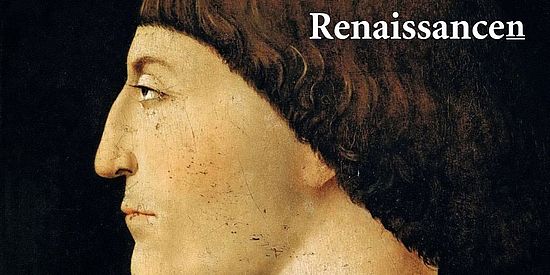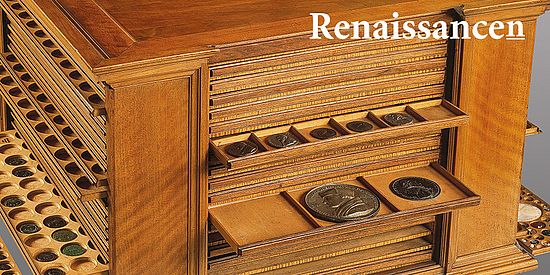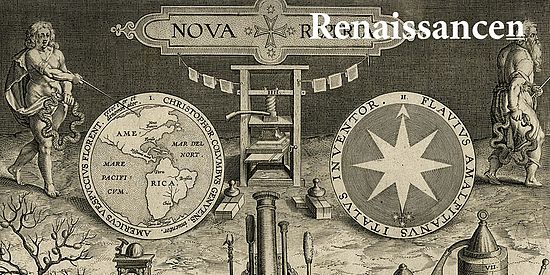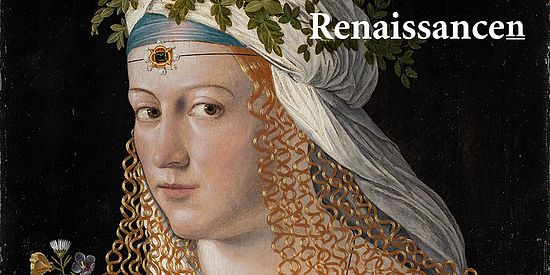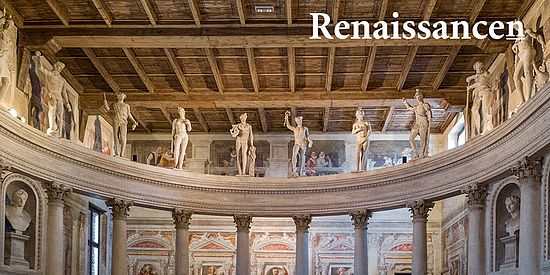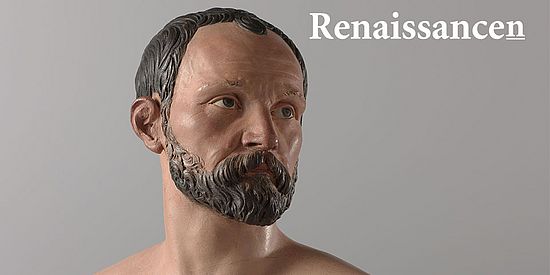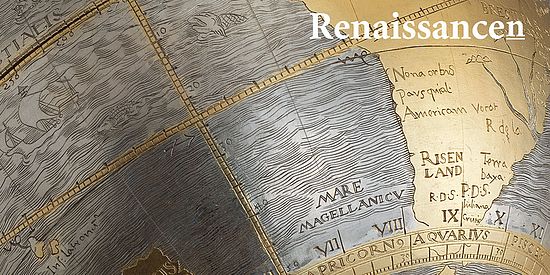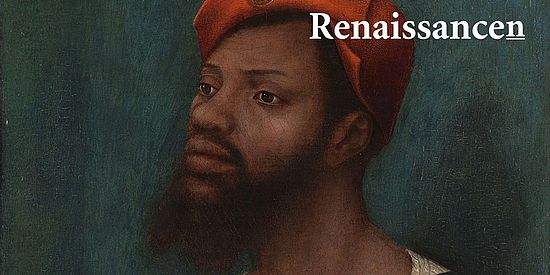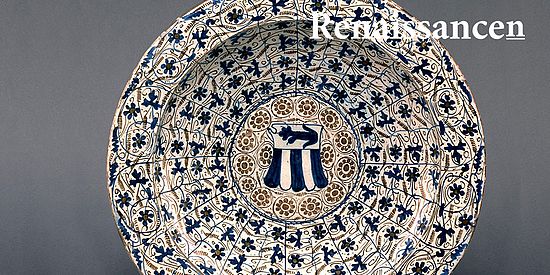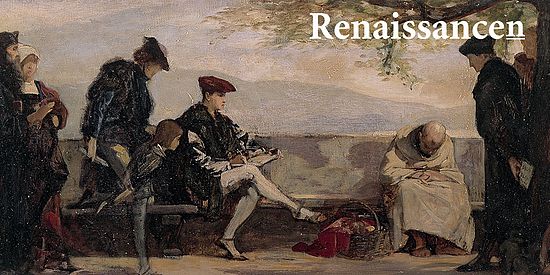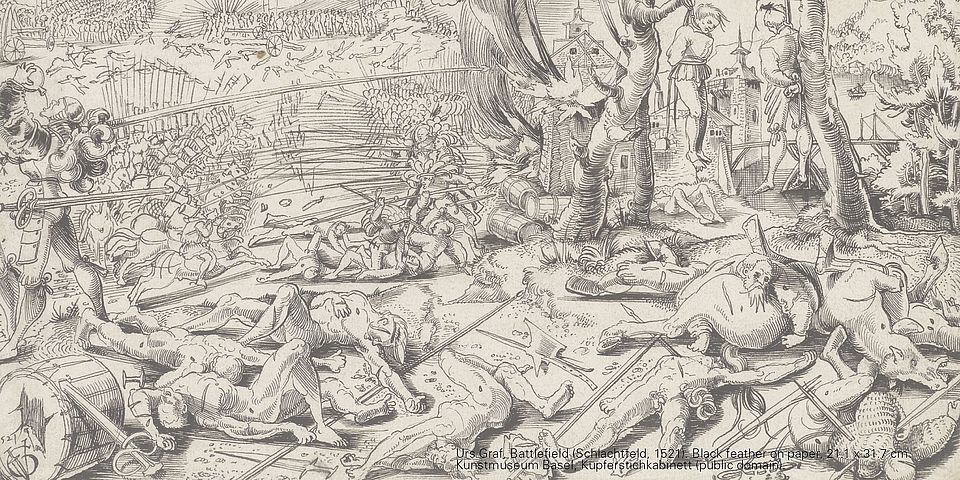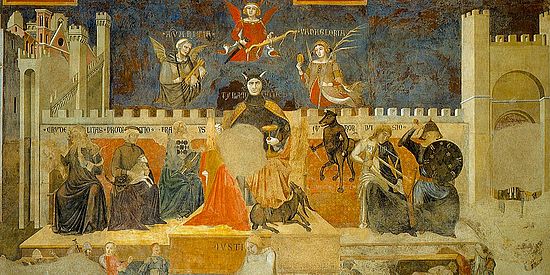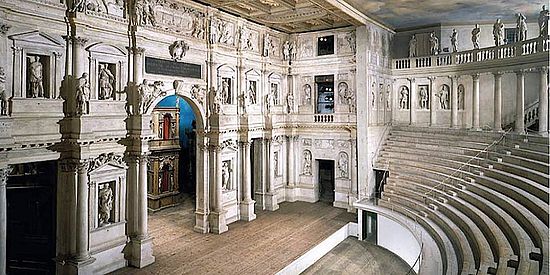Das Kolloquium versteht die Renaissance als doppelgesichtigen Projektionsraum: Als Epochenkonzept sowie als Reflexionskategorie, als Zeitraum, in dem wir den Beginn der Moderne lokalisieren und zugleich seine ständig wachsende Fremdheit konstatieren, aber auch als Chance, die für die historischen Wissenschaften zentrale Epochengrenze zwischen Mittelalter und Neuzeit weiter zu dynamisieren. Aus materiellen wie wissenschaftsgeschichtlichen Gründen liegt dabei der Fokus auf dem 14. bis 17. Jahrhundert.
Nächster Termin
Das Basler Renaissancekolloquium bietet mit thematisch ausgerichteten Veranstaltungen Gelegenheit zum interdisziplinären Gespräch zwischen allen Fächern, die an historischen Transformationsprozessen, Fragen der Traditionsbildung und an der Konstruktion historischer Typologien interessiert sind. Als interdisziplinär ausgerichtete Veranstaltung wird das Basler Renaissancekolloquium vom Departement Geschichte (Lucas Burkart) und dem Kunsthistorischen Seminar (Aden Kumler) getragen; es ist Teil des Angebots der Basel Graduate School of History.
Begründet wurde das Basler Kolloquium im Wintersemester 2005/06 als überregional ausgerichtetes Diskussionsforum und auf Initiative von Prof. em. Dr. Susanna Burghartz, Prof. em. Dr. Achatz von Müller und Prof. Dr. Andreas Beyer.
Basler Renaissancekolloquium
Departement Geschichte
Hirschgässlein 21
CH-4051 Basel
Tel: +41 61 207 46 66
renaissance@unibas.ch
56. Basler Renaissance Kolloquium - "Renaissance of War"
4. April 2025, 14h15 - 18h30
Kunsthistorisches Seminar, Raum 131 - St. Alban-Graben 8/10, 4051 Basel
Outline
If recent geopolitical developments have prompted intensified public conversations and debate about war and warfare, Renaissance studies has long pursued a comprehensive understanding of war as a social phenomenon. Harking back to Jacob Burckhardt’s conceptualization of ‘the [Renaissance] state as a work of art’, Renaissance historiography has traditionally taken a holistic view of socio-political processes in which power and violence were deeply intertwined with aesthetics, cultural production, and systems of patronage. War in the Renaissance is a case in point: recent scholarship has made significant inroads in highlighting, for example, the social and financial implications of mercenary cultures, the use of military motifs in representations of the Renaissance state, and contemporary perceptions of the social and moral consequences of war as reflected in artistic and discursive practices and early print cultures.
The 56th Basel Renaissance Colloquium focuses upon war in the Renaissance as a phenomenon, a practice, and a cultural formation with powerful implications that extended far beyond the battlefield. Inquiring further into the political, institutional, and aesthetic dynamics and consequences of warfare, we propose to examine war as an explicit feature of the Renaissance, both in the sense of an epochal framework of European history and as a potentially transferable historiographical model. Examining war in this light, a series of questions arise: was there a specificity of ‘Renaissance war’, and, if so, what was its impact on subsequent social, economic, technological, and/or and artistic trends? How might the destructive dynamics of warfare have also served as a vector of social transformation? What can be learned from Renaissance ethical and moral regimes that tolerated or even advanced warfare as a political tool while simultaneously pointing to its dangers? How can we tell histories of organized violence as it was experienced by non-combatants and former combatants: persons displaced and dispossessed by warfare; women who traveled with armies as sex-workers, laundresses, and porters; disabled ex-soldiers, whose bodies testified to the brutality of past military campaigns?
Renaissance of War thus invites critical reassessments of the general implications as well as the social, material, and intellectual conditions of organized violence. The meeting is intended as an interdisciplinary forum open to (and seeking to combine) social, political, intellectual, and art historical methods, as well as approaches that engage with non-European/global contexts and influences. We are particularly interested in comparative, connected, and “bottom up” approaches, as well as in thematic contributions relating to, for example: narratives of victory, victimhood, and survival; the aestheticizing, heroizing, and (visual) critique of military violence; the construction, representation, and differentiation of social roles and responsibilities amidst military conflicts; the forms of transformation both foreclosed and propelled by war in the Renaissance.
The colloquium will allow for individual presentations of about 30 minutes in length, followed by questions and a final roundtable discussion.
Shadow Agents of Renaissance War
Stephen Bowd (Edinburgh)
In this paper I will address some intersections between key groups and themes in the history of Renaissance warfare in order to stimulate discussion about future directions for research. First of all, I will present the initial findings of my analysis of the letters written by Italian elite women who were involved in war or war-related activities after 1494. I will then consider how a gendered analysis might be brought more closely into dialogue with other developing fields in the history of war, notably material culture and the evidence of losses of goods during the sacks of cities. What can such evidence, including the extensive insurance claims or lists of bequests made to monasteries after peace is restored, reveal about the different experiences and outlooks of men and women in relation to war? Finally, I will consider the presence of books in warfare ― both as material objects and as sources for a broader and better understanding of that 'well-trained mob' (Josephus), the camp followers or 'campaign community' (John Lynn).
The Threat of Dispossession in German Treasure Hoards of the 1630s
Allison Stielau (London)
In early modernity the procedures of warfare separated people from their possessions in many different ways, from looting to forced contribution to the purchasing of safety with treasure. The enormous pressure placed on goods in such contexts reveals much about their value, both to civic groups and religious institutions, as well as individuals. Although war seemed adept at reducing all objects to pure financial value and increasing the speed at which goods were traded and displaced, some resonant possessions still motivated efforts to protect and preserve them, thus demonstrating their non-pecuniary significance. This talk considers three treasure hoards that were hidden in the 1630s, when the sieges and battles of the Thirty Years’ War were devastating Southern Germany. Discovered in the nineteenth and twentieth centuries, these small groups of silver cups, girdles, spoons, and amulets identify the objects most valuable to elite families at this moment and suggest some of the strategic thinking with which historical actors handled their moveable goods when the threat of dispossession loomed. The mode of interpretation required by the treasure hoards departs from many methods of historical and art historical analysis, as well as those of material culture studies, because it is focused not so much on the features of individual objects, and vectors out to the original moment of production, but rather on what can be gleaned about the context of deposition and how that period of fear and instability informed the meaning of a silver cup or girdle in the 1630s. Wordless, largely displaced, and for the most part unable to find connection to historical figures in existing archives, these caches of objects nevertheless offer remarkable evidence for non-combatants’ experience of wartime emergency. They testify to the fear of dispossession while at the same time serving as proof in each case that dispossession did indeed occur.
The Renaissance and the Gun
Catherine Fletcher (Manchester)
The proliferation of handguns into Italy coincided with the Renaissance. Firearm designs and technologies appear in the manuscripts of Leonardo da Vinci. Guns were not, however, reborn from the classical world but thoroughly modern weapons. The cultural world of sixteenth-century Europe accommodated quite contradictory attitudes to firearms. In literature, there was general hostility: guns were diabolical, unchivalrous, and impious. Luxury weapons, however, incorporated in their design numerous conventional motifs of the Renaissance court, both in their iconography and their materials. Turning to the world of art, we find further contradictions. Paintings of gun users are few and far between in Italy (unless we count Titian’s equestrian portrait of Charles V), but the Low Countries had a strong tradition of portraying its civic militia with firearms, a trend beginning in the sixteenth century that eventually informed Rembrandt’s Night Watch. Guns were arguably even more acceptable beyond the continent of Europe, in the growing empires, where Fernando Cortés broke decisively with the idea that firearms were the devil’s work, and reported that ‘God had provided’ the ingredients for gunpowder. What can these histories of the gun tell us about the Renaissance?
Veranstaltungsarchiv
| BRK55 | «Renaissance of Diplomacy» | 13. Dezember 2024 | Programm | Abstracts |
| BRK54 | «Secret Renaissance» | 14. Mai 2024 | Programm | Abstracts |
| BRK53 | «meta-renaissance(s)» | 3. November 2023 | Programm | Abstracts |
| BRK52 | «Renaissance Properties» | 5. Mai 2023 | Programm | Abstracts |
| BRK51 | «Dark Renaissance» | 2. Dezember 2022 | Programm | Abstracts |
| BRK50 | «Renaissance Patterns – Muster der Renaissance» | 20. Mai 2022 | Programm | |
| BRK49 | «Geologie der Renaissance» | 23. April 2021 | Programm | |
| BRK48 | «Die Renaissance – eine Begriffsdiskussion» | 11. Dezember 2020 | Programm | Bericht |
| BRK47 | «African Renaissance» | 2. Oktober 2020 | Programm |
| BRK46 | «Gerüstete Renaissance» | 13. Dezember 2019 | Programm | Bericht |
| BRK45 | «Renaissance Underground» | 18. Oktober 2019 | Programm | Bericht |
| BRK44 | «Travel, Maps and Ethnography» | 24. Mai 2019 | Programm | Bericht |
| BRK43 | «Verschleierte Renaissance» | 14. Dezemer 2018 | Programm | Bericht |
| BRK42 | «Tiere» | 19. Oktober 2018 | Programm | Bericht |
| BRK41 | «Fashionable Renaissance» | 10. November 2017 | Programm | Bericht |
| BRK40 | «Reformation und Renaissance» | 21. April 2017 | Programm | Bericht |
| BRK39 | «Athletische Renaissance – Sport und Jagd in der frühen Neuzeit» | 28. Oktober 2016 | Programm | Bericht |
| BRK38 | «Renaissance Books - A Mediology» | 11. März 2016 | Programm | Bericht |
| BRK37 | «Globalizing the Renaissance - New Perspectives» | 4. Dezember 2015 | Programm | Bericht |
| BRK36 | «Autorenschaft und Person» | 8. Mai 2015 | Programm | Bericht |
| BRK35 | «Ungleichheiten» | 6. März 2015 | Programm | Bericht |
| BRK34 | «Körper und Herrschaft» | 14. November 2014 | Programm | Bericht |
| BRK33 | «Schiffbruch: Erfolgsgeschichten des Scheiterns» | 3. Oktober 2014 | Programm | Bericht |
| BRK32 | «Fundamente der Moderne» | 16. Mai 2014 | Programm | Bericht |
| BRK31 | «Talking about Desire - Writing the Renaissance» | 7. März 2014 | Programm | Bericht |
| BRK30 | «Schauplatz Buch: Vernetzung und Zirkulation» | 13. Dezember 2013 | Programm | Bericht |
| BRK29 | «Invidia – ein Affekt zwischen Ökonomie und Moral» | 18. Oktober 2013 | Programm | Bericht |
| BRK28 | «Vermessungen» | 17. Mai 2013 | Programm | Bericht |
| BRK27 | «Briefgefühle» | 15. März 2013 | Programm | Bericht |
| BRK26 | «Schöne Gesellschaften? Asymmetrie und Vollkommenheit» | 14. Dezember 2012 | Programm | Bericht |
| BRK25 | «trading zones – contact zones – entanglement. Theorien und Konzepte auf dem Prüfstand» | 12. Dezember 2012 | Programm | Bericht |
| BRK24 | «Wissensordnungen» | 25. Mai 2012 | Programm | Bericht |
| BRK23 | «Verzeitlichung» | 27. April 2012 | Programm | Bericht |
| BRK22 | «Das Wissen der Sammler» | 2. Dezember 2011 | Programm | Bericht |
| BRK21 | «Renaissance décentrée - dezentrierte Renaissance» | 7. Oktober 2011 | Programm | Bericht |
| BRK20 | «Epoche - Mythos - Konzept» | 3. Juni 2011 | Programm | Bericht |
| BRK19 | «Luxuroius Renaissance» | 1. April 2011 | Programm | Bericht |
| BRK18 | «Konsum und Geschäft - Consumer‘s Renaissance» | 3. Dezember 2010 | Programm | Bericht |
| BRK17 | «Buchgeld - Die Versprechungen der Hypnerotomachia Poliphili» | 29. Oktober 2010 | Programm | Bericht |
| BRK16 | «Gelehrtenkultur und Wissenspraxis» | 28. Mai 2010 | Programm | |
| BRK15 | «Fragile Männlichkeit» | 10. März 2010 | Programm | Bericht |
| BRK14 | «Räume der Renaissance» | 13. November 2009 | Programm | Bericht |
| BRK13 | «Renaissance und Religion» | 25. September 2009 | Programm | Bericht |
| BRK12 | «Körper - Natur - Wissenschaft» | 12. Dezember 2008 | Programm | Bericht |
| BRK11 | «Renaissancismus» | 17. Oktober 2008 | Programm | |
| BRK10 | «Das Mittelmeer: Kontakt- oder Konfliktraum?» | 23. Mai 2008 | Programm | Bericht |
| BRK9 | «Konzil und kulturelle Kommunikation» | 4. April 2008 | Programm | Bericht |
| BRK8 | «Kulturelle Austauschprozesse in der Renaissance» | 14. Dezember 2007 | Programm | Bericht |
| BRK7 | «Renaissance als internationaler Modernisierungsprozess» | 19. Oktober 2007 | Programm | Bericht |
| BRK6 | «Die Renaissance der Anderen?» | 19. April 2007 | Programm | Bericht |
| BRK5 | «Paradigma Antika» | 8. Dezember 2006 | Programm | |
| BRK4 | «Kunstpatronage: Neue Forschungsperspektiven» | 22. Juni 2006 | Programm | |
| BRK3 | «Identität und Differenz: Kostüm und Nacktheit» | 28. April 2006 | Programm | |
| BRK2 | «Die Renaissance und der Norden» | 27. Januar 2006 | ||
| BRK1 | «Renaissance heute – eine wissenschaftskritische Terrainerkundung» | 9. Dezember 2005 | Programm |
Quick Links
Social Media

